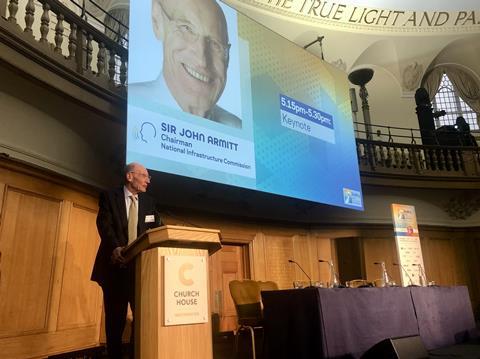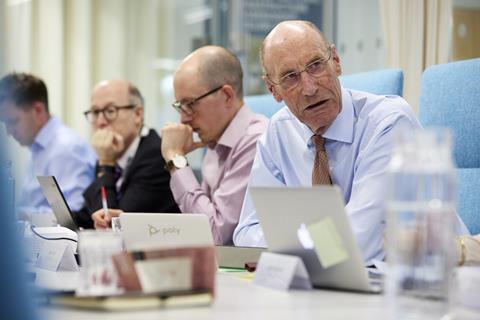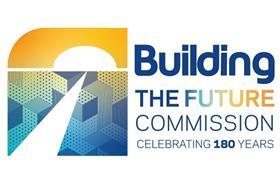NIC chair adds chopping and changing flagship project sends ‘incredibly negative message’ to world
Sir John Armitt has said the consequence of cutting HS2 will be to turn the country’s flagship infrastructure scheme into little more than a “shuttle” between west London and Birmingham.
Speaking at ∫√…´œ»…˙TV‚Äôs ∫√…´œ»…˙TV the Future Commission conference in London this afternoon, the chairman of the National Infrastructure Commission (NIC) warned politicians of interfering too much and ripping up plans halfway through jobs.

He said: “While politics will never be removed from infrastructure, and ministers will understandably want to shape the direction of major programmes, we need to face up to the implications of chopping and changing policy.
“Curtailing the High Speed 2 route so it becomes a shuttle between Acton and Birmingham makes no economic sense.
“Yes, costs have to be controlled in a serious and methodical manner. But lopping off legs will only reduce the capacity and connectivity benefits the full project will bring to some of this country’s major city regions.
“And furthermore, a retreat on the scope would send an incredibly negative message around the world about the UK’s approach to major infrastructure projects.”
He said ministers should talk to industry more, rather than chop and change all the time.
He added: “HS2 may be foremost on minds at the moment, but others here may recall the U-turn on Zero Carbon Homes, when in 2007 the then government announced that all new homes would have to be zero carbon by 2016.
“Industry warned that would be very difficult; but government insisted, so industry put its shoulder to the wheel. Then in 2015, government pulled the plug. Ministers should listen to industry’s evidence-based views and concerns.”
And Armitt told the event that politicians had to be more consistent with their decisions – and stick to them.
“Ultimately, politicians are there to take the tough decisions. But if the private sector is to play its part in delivering major public objectives – whether that is net zero, or levelling up, or even meeting the housebuilding target – it needs a stable policy and regulatory environment.
“That is best achieved through a long-term plan that is forged collaboratively between public and private sectors, including regulators – and then, crucially, sticking to it. This is the missing link between high level plans and targets, and getting stuff done on the ground.”

The NIC is due to present its next National Infrastructure Assessment on 18 October.
The assessment is published every five years and sets out costed recommendations to government on priorities for the next 20 to 30 years.
Meanwhile, five regional mayors, including London mayor Sadiq Khan, Greater Manchester’s Andy Burnham and West Yorkshire mayor Tracy Brabin, have asked to meet with prime minister Rishi Sunak to discuss the plans to cut HS2.
In a joint statement, they said: “We release this statement to express dismay on behalf of our regions at the news that the government is considering scrapping HS2 or curtailing it to such a degree that it will fail to produce any meaningful economic benefit. Over recent days we have been inundated by concern from businesses across our regions about the economic damage that will result from any decision not to proceed with HS2 and Northern Powerhouse Rail in full.”
Asked whether he thought HS2 would be cut, one chief executive of a major contractor told ∫√…´œ»…˙TV: ‚ÄúI know what they should do. Get everyone in a ****ing room and work out how to build it more cheaply.‚Äù
About the commission

The ∫√…´œ»…˙TV the Future Commission is a 12-month project looking at radical and challenging ideas that could help transform the built environment.
The campaign aims to tap into innovative ideas, amplify them and be an agent for change.
The major project’s work will be guided by a panel of major figures who have signed up to help shape the commission’s work culminating in a report published at the end of the year.
The commissioners include figures from the world of contracting, housing development, architecture, policy-making, skills, design, place-making, infrastructure, consultancy and legal. See the full list here.
The project is looking at proposals for change in eight areas:
- Education and skills
- Housing and planning
- Energy and net zero
- Infrastructure
- ∫√…´œ»…˙TV safety
- Project delivery and digital
- Workplace culture and leadership
- Creating communities
>> Editor‚Äôs view: And now for something completely positive - our ∫√…´œ»…˙TV the Future Commission
>> Click here for more about the project and the commissioners
∫√…´œ»…˙TV the Future is also undertaking a countrywide tour of roundtable discussions with experts around the regions as part of a consultation programme in partnership with the regional arms of industry body Constructing Excellence. There is also a young person‚Äôs advisory panel.


























No comments yet